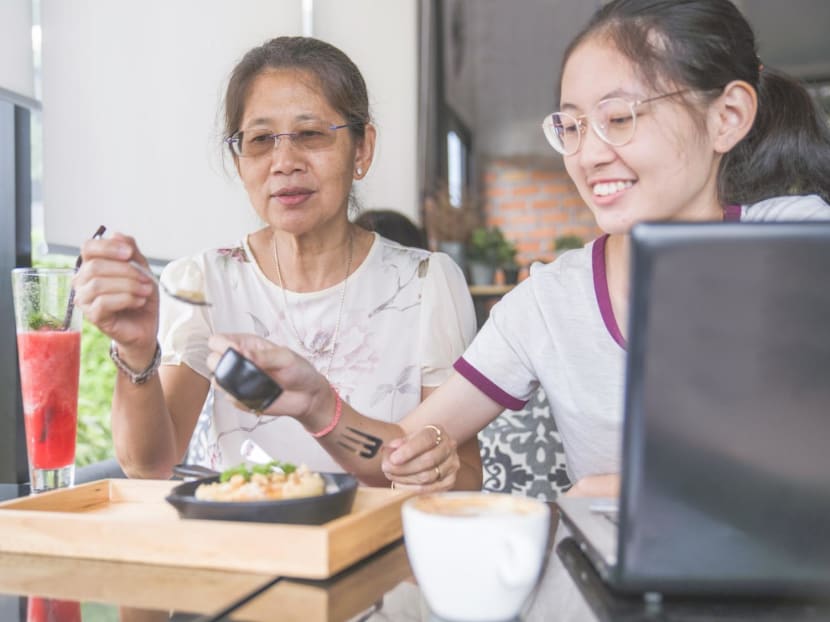News analysis: Why the young should take an interest in taking good care of seniors as Singapore’s population ages
SINGAPORE — A society that does well in caring for seniors will pave the way for the young to reap the benefits as well, experts said.

- A society that does well in caring for its seniors is also one that would benefit its younger generations, experts said
- Some sociology and gerontology experts were commenting on the Government’s latest action plan that aims to bolster support for young caregivers, for example
- The goals outlined in the national plan would have spillover benefits for the younger population in the short term and when they themselves grow old
SINGAPORE — A society that does well in caring for seniors will pave the way for the young to reap the benefits as well, experts said.
Sociology and gerontology experts who spoke to TODAY said that they welcomed the refreshed Action Plan for Successful Ageing that was unveiled by the Government on Monday (Jan 30), adding that it would support young people who are or will become caregivers for their ageing parents.
The initiatives and policy changes outlined in the plans would also one day be useful to the younger population when they, too, join the ranks of being ageing citizens.
The 2023 Action Plan for Successful Ageing is a multi-agency initiative helmed by the Ministry of Health (MOH) and builds upon the first action plan launched in 2015.
It was formulated after engagement sessions with about 5,000 members of the public.
Among its goals is to offer more financial assistance for caregivers as well as better support for elders, such as measures against workplace discrimination and greater access to activities to keep them active and engaged in the community.
WHY IT MATTERS TO THE YOUNG
Dr Kelvin Tan, head of the Minor in Applied Ageing Studies programme at the Singapore University of Social Sciences (SUSS), said that successful and active ageing in society would inevitably lead to spillover benefits for their caregivers.
“If older persons in the family can be more independent, the younger generation will feel less burnout from any caregiver role and also experience lesser financial stress,” he added.
“They can plan for a bigger family, build their career and enjoy a more care-free life.”
Agreeing, sociologist Shannon Ang from Nanyang Technological University said that how a society treats and provides for elders, “especially those who are most vulnerable”, gives insight into what it values and prioritises, whether it be health, autonomy or family.
Such values would “reverberate” into all domains of life and concern the entire society, not just the seniors.
For example, under the action plan, a new set of Tripartite Guidelines on Flexible Work Arrangements will be introduced by 2024.
“A decision to relegate most care work to family members, or to alter workplace policies, can affect both young and old,” Assistant Professor Ang said.
Not only would flexible work arrangements allow seniors to stay in the workforce but at a pace and commitment level of their choosing, it would also allow caregivers to more easily work around their family commitments.
He pointed out that many changes needed to help older adults to live well are structural in nature.
For example, the action plan would look into boosting the capabilities and capacity of care providers, and stepping up early detection and preventive actions for dementia, which at the moment affect about one in 10 people aged 60 and above.
“Investments in measures addressing systemic factors will reap long-term benefits that will benefit younger people as and when they age,” he added.
WHAT MORE CAN BE DONE
Ms Tricia Lee, head of communications at Caregivers Alliance Limited, said that the non-profit organisation welcomes the changes and enhanced support for caregivers.
However, it is the organisation’s belief that caregiving should not fall on one individual within the family.
“(We) often encourage secondary caregivers, including younger family members, to attend our programmes. This takes the burden off the primary caregiver, preventing burnout,” Ms Lee added.
Dr Tan of SUSS said that beyond the initiatives laid out in the action plan, there may be more opportunities “for younger and older persons to co-create innovations”.
Such collaborations in Japan, for instance, have helped its society explore business opportunities that cater to its ageing population, in fields such as technology for social companionship that could involve robots, smart technology for home, as well as fashion and designer clothing lines for older adults.
Asst Prof Ang said that for society to help people age successfully, younger adults should “treat older people like they would treat themselves — as complex and diverse human beings with hopes, needs and aspirations”.
Instead of falling back on “pointless stereotypes”, younger adults can build friendships across generations, he added.
They should also pay attention to older adults’ aspirations instead of treating them as a liability.
For example, this would mean looking at how technology can help them achieve what they want instead of merely using gadgets or digital tools to entertain them or surveil them.
Ultimately, society should “advocate for structural measures that help us all”, Asst Prof Ang said, such as better working conditions, more inclusive infrastructure and more robust health systems.











